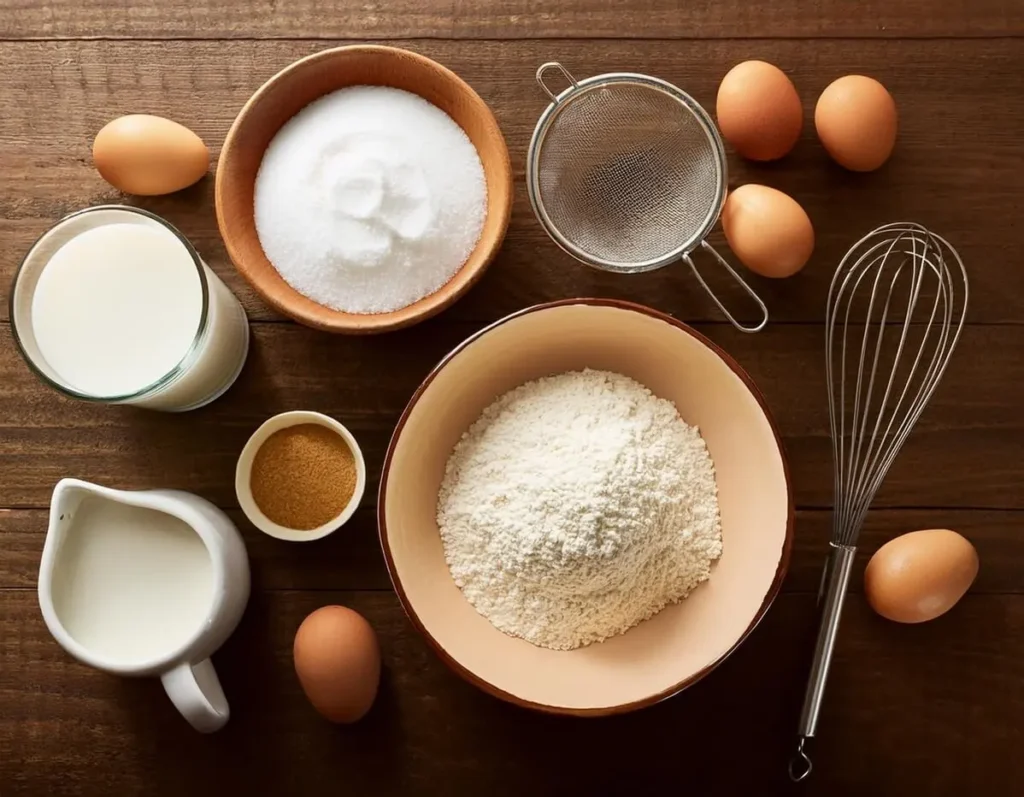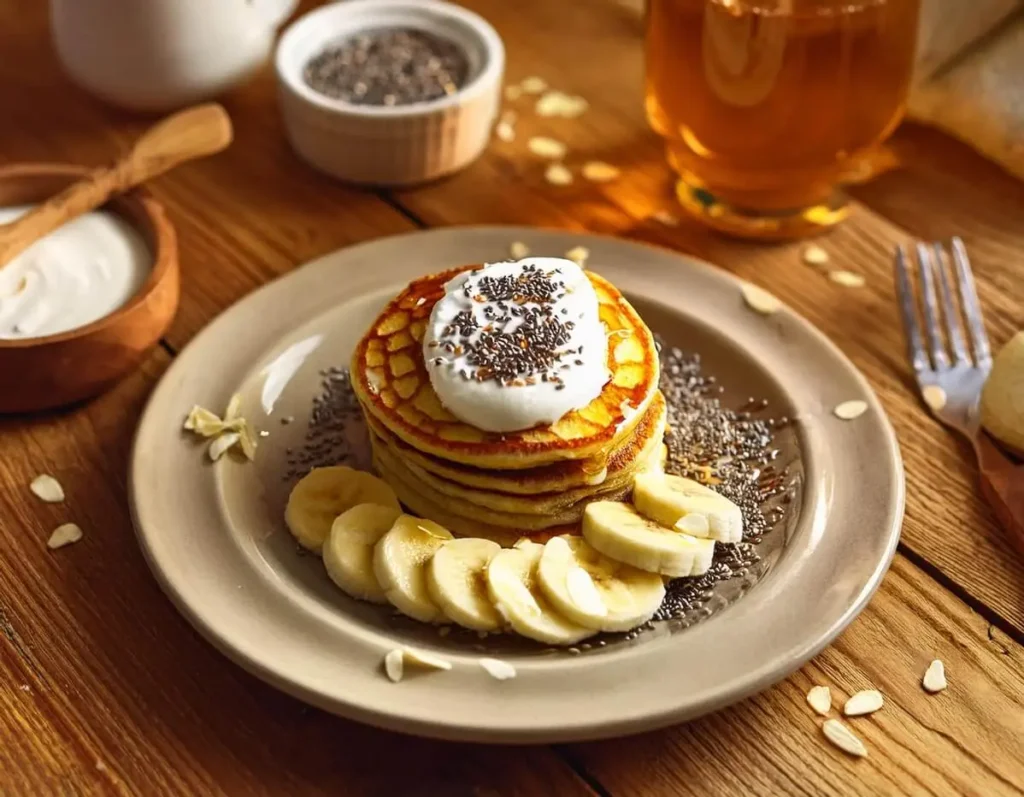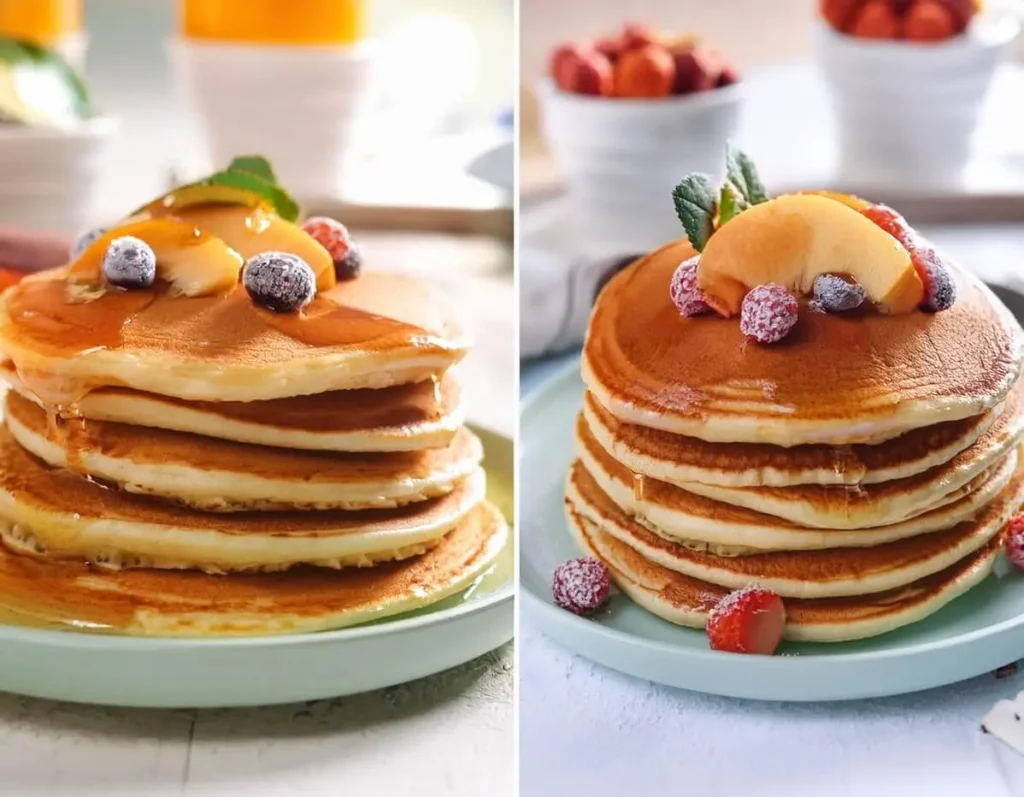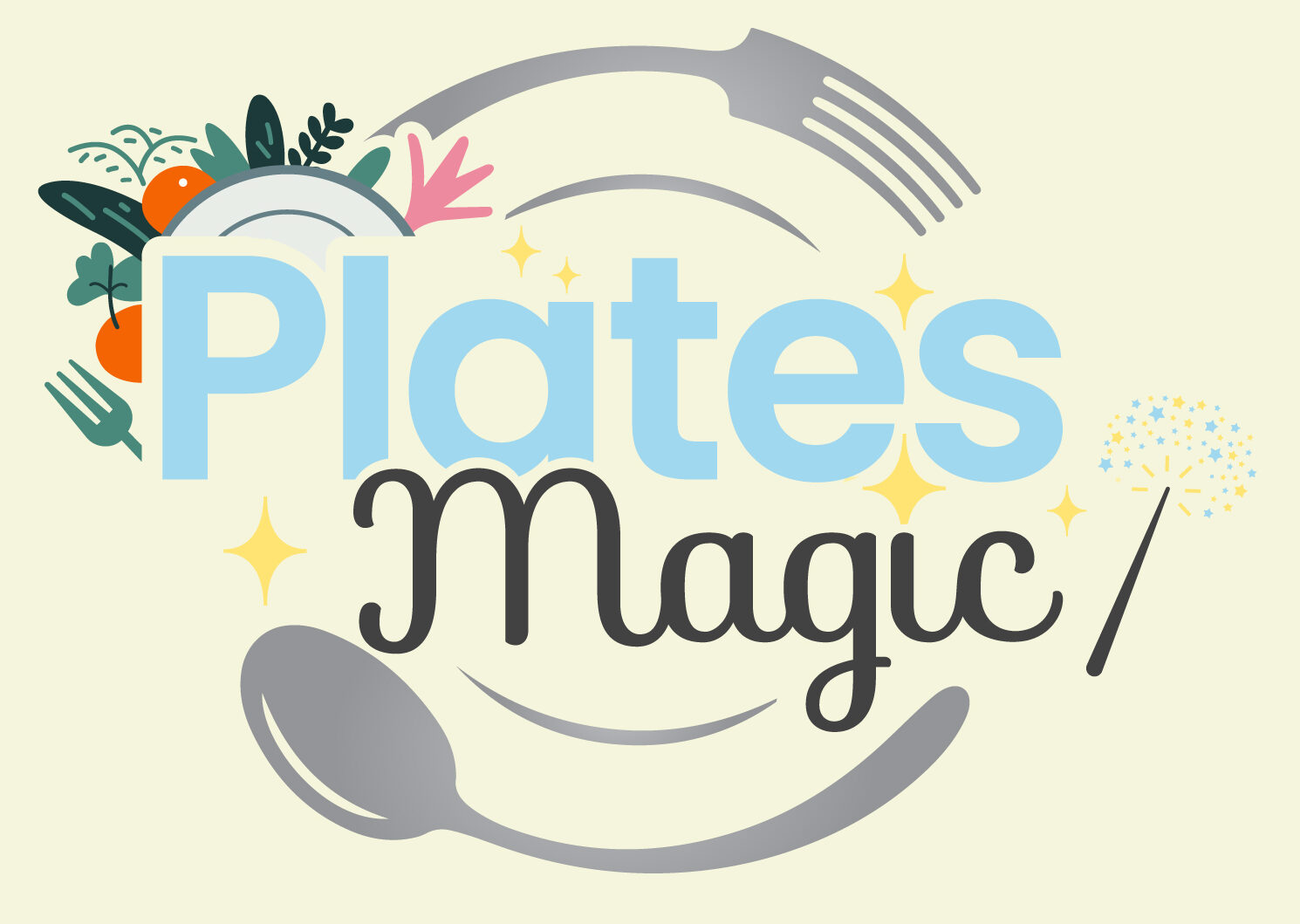1. Introduction
Pancakes are a beloved breakfast staple, cherished for their light, fluffy texture and ability to be customized with endless toppings. From classic buttermilk pancakes to modern variations like protein-packed or gluten-free options, this dish has earned its place on breakfast tables worldwide. But as the conversation around nutrition grows, many wonder: Are pancakes healthy carbs?
At their core, pancakes are carbohydrate-heavy, thanks to ingredients like flour and sugar. While carbohydrates provide energy, not all carbs are created equal. The type of carbs and the other ingredients in pancakes can significantly impact their healthiness. For some, pancakes might seem like an indulgent treat, while others find ways to incorporate them into balanced diets.
This article delves into the nutritional makeup of pancakes, answering key questions like whether they’re good carbs or empty calories. We’ll also explore how pancakes fit into different dietary goals, such as weight loss, and provide practical tips for making healthier versions at home. Whether you’re a pancake enthusiast or a health-conscious eater, this guide will help you make informed choices about your breakfast favorites.
2. Understanding Pancakes as Carbs
What Are Pancakes Made Of?

Traditional pancakes are made from a simple mixture of flour, eggs, milk, and sugar, combined with a leavening agent like baking powder. Flour is the primary ingredient, providing structure and texture. However, it also makes pancakes predominantly carbohydrate-based. Eggs add protein and help bind the ingredients, while milk contributes moisture and additional nutrients. Sugar, though minimal in most recipes, enhances flavor but adds to the carbohydrate count.
The question often arises: Are pancakes carbs or protein? While eggs and milk provide small amounts of protein, pancakes are predominantly a carbohydrate-rich food due to their flour and sugar content. This carb-heavy nature makes them a quick source of energy but also raises concerns about their healthiness, particularly when combined with sugary toppings like syrup.
Are Pancakes Healthy Carbs or Empty Calories?
To determine whether pancakes are healthy carbs, it’s essential to distinguish between healthy and refined carbs. Healthy carbs, found in whole grains, fruits, and vegetables, are nutrient-dense and provide lasting energy. In contrast, refined carbs, like those in traditional pancakes, lack fiber and essential nutrients, leading to quick energy spikes and crashes.
The glycemic index (GI) of pancakes is typically high due to the refined flour and sugar, meaning they can cause blood sugar levels to spike rapidly. This characteristic often leads to pancakes being categorized as “empty calories” if made with traditional ingredients. Traditional pancakes often rank high on the glycemic index, meaning they can cause rapid blood sugar spikes and crashes.
So, are pancakes healthy carbs? The answer depends on the ingredients and preparation. While traditional pancakes lean toward refined carbs, choosing whole-grain flour or reducing sugar can shift them toward being healthier carb sources. Healthy carbs, such as whole grains and vegetables, provide nutrients and fiber, unlike refined carbs commonly found in traditional pancake recipes. Learn more about healthy carbs.
3. Nutritional Profile of Pancakes
How Many Carbs Are in Pancakes?

The carbohydrate content of pancakes can vary significantly depending on the ingredients and portion size. On average, a single medium-sized pancake (approximately 4 inches in diameter) contains around 12–15 grams of carbohydrates. This figure increases significantly when pancakes are served with traditional toppings.
When adding syrup, the carb count rises sharply. For instance, how many carbs are in a pancake with syrup? Just one tablespoon of maple syrup contains about 13 grams of carbohydrates, nearly doubling the carb load of a single pancake. A serving of two pancakes with syrup can easily exceed 40 grams of carbs, making it a high-carb meal.
Considering calories, 1 pancake with syrup typically contains about 150–200 calories, depending on the serving size and syrup quantity. This highlights how toppings can quickly change the nutritional profile of what might seem like a simple breakfast option.
Are Pancakes Healthy Without Syrup?
Toppings significantly influence whether pancakes are healthy or not. Without syrup, pancakes retain their base carb and calorie content, but eliminating syrup removes a substantial amount of added sugar. This makes them less likely to cause energy crashes and reduces their glycemic impact.
Are pancakes healthy without syrup? The answer leans more positively when alternative toppings are considered. Fresh fruits like berries or banana slices add natural sweetness along with vitamins and fiber. Greek yogurt or nut butter can introduce protein and healthy fats, making the meal more balanced and satisfying. These swaps not only reduce sugar intake but also enhance the overall nutritional value of the dish.
Choosing healthier toppings is an easy way to make pancakes part of a more balanced and nutritious diet.
4. Health Implications of Eating Pancakes
Is Pancake Healthy or Unhealthy?
Traditional pancakes have a reputation for being a comfort food, but their healthiness depends on their ingredients and how they’re consumed. Pancakes made with refined flour and sugar can cause sugar spikes due to their high glycemic index. These rapid energy surges often result in energy crashes, leaving you feeling fatigued shortly after eating. Additionally, traditional pancakes are low in fiber, which is crucial for digestion and maintaining stable blood sugar levels.
When compared to other breakfast options like oats or eggs, pancakes fall short in terms of nutrition. Oats are high in fiber and provide slow-releasing energy, making them a better choice for those looking to stay full for longer. Similarly, eggs are a rich source of protein and healthy fats, which support muscle repair and satiety.
However, are pancakes healthy carbs and sugar? While they are primarily a source of carbs, traditional recipes lean toward refined carbs and added sugars, making them less favorable for long-term health if eaten regularly without modifications.
Can Pancakes Be Part of a Healthy Diet?
Despite their drawbacks, pancakes can fit into a healthy diet with the right adjustments. Portion control is key; limiting the number of pancakes you consume can help manage calorie and carb intake. Additionally, ingredient substitutions can transform pancakes into a healthier meal.
Using whole-grain or almond flour instead of refined white flour increases the fiber and nutrient content. Replacing sugar with natural sweeteners like honey or stevia reduces added sugar without compromising taste. Adding ingredients like chia seeds or protein powder can also improve the overall nutritional profile.
Can pancakes be part of a healthy diet? The answer is yes, but with moderation and thoughtful preparation. Instead of stacking your plate high and drowning pancakes in syrup, opt for a single or double serving paired with nutrient-rich toppings like fresh fruits, nuts, or Greek yogurt. Balancing pancakes with other protein-rich or fibrous foods ensures a more satisfying and well-rounded meal.
By taking these steps, you can enjoy pancakes occasionally while maintaining a healthy and balanced diet.
5. Healthier Pancake Options
What Are the Healthiest Pancakes to Eat?

The healthiest pancakes to eat are those made with nutrient-dense ingredients that provide lasting energy and improve overall health. Traditional pancakes can be upgraded by swapping refined flour for whole-grain options like whole wheat or oat flour. These flours are rich in fiber, which supports digestion and helps maintain stable blood sugar levels. Pancakes made with whole-grain or almond flour are often considered among the healthiest types of pancakes, as they are rich in nutrients and fiber.
For a gluten-free alternative, almond flour is an excellent choice. It is low in carbs, high in protein, and provides healthy fats. Adding protein powder to the batter is another way to boost the protein content, making pancakes more filling and balanced. To further enhance the nutritional profile, incorporate chia seeds or ground flaxseeds into the batter for added fiber, omega-3 fatty acids, and a subtle crunch.
So, what are the healthiest pancakes to eat? Pancakes made with whole-grain or alternative flours, minimal sugar, and nutrient-rich add-ins like oats or seeds are a healthier choice. They provide energy while minimizing blood sugar spikes and promoting satiety.
Tips for Making Healthier Pancakes
Making pancakes healthier doesn’t require sacrificing taste. Simple adjustments can go a long way in creating a balanced and enjoyable meal. First, use minimal sugar or replace it with natural sweeteners like honey, maple syrup, or mashed bananas. These alternatives add sweetness while reducing added sugar.
Cooking techniques also matter. Opt for a non-stick pan to minimize the need for oil or butter. If oil is necessary, use healthier options like avocado oil or coconut oil in small amounts. Additionally, replacing milk with plant-based alternatives like almond or oat milk can make pancakes lighter and suitable for those with dietary restrictions. Adding probiotic-rich ingredients like kefir or yogurt to the batter not only enhances texture but also supports gut health.
When considering are pancakes healthy carbs for weight loss, portion control is crucial. Stick to one or two pancakes per serving and pair them with high-protein sides like scrambled eggs or Greek yogurt to maintain a balanced meal. Avoid calorie-dense toppings and choose fresh fruits or a drizzle of honey instead. Replacing regular milk with almond or oat milk can make pancakes suitable for individuals seeking dairy-free pancake options.
By following these tips and choosing nutrient-rich ingredients, you can enjoy pancakes as part of a healthy, balanced diet.
6. Frequently Asked Questions About Pancakes and Carbs
Are Pancakes a Good Carb?
Pancakes can be considered a good carb if made with the right ingredients. Traditional pancakes made with refined flour and sugar are generally less healthy due to their high glycemic index and lack of nutrients. However, swapping refined flour for whole-grain or almond flour and reducing added sugars can transform them into a healthier carb source. These changes increase fiber and nutrient content, providing longer-lasting energy and reducing blood sugar spikes.
To make pancakes a good carb choice, pair them with nutrient-rich toppings like fresh fruits, nuts, or yogurt, and balance them with protein-packed sides. This ensures you’re consuming a meal that supports energy levels and overall health.
How Many Carbs in 2 Pancakes?
The carbohydrate content of pancakes depends on their size and ingredients. On average, two medium-sized traditional pancakes contain approximately 24–30 grams of carbs. Adding toppings like syrup significantly increases this count, with one tablespoon of syrup adding around 13 grams of carbs.
For those monitoring carb intake, opting for smaller pancakes or reducing sugary toppings can help control total carb consumption.
3 Pancake Calories
The calorie count of three pancakes varies depending on ingredients and serving size. On average, three medium pancakes without toppings contain about 300–400 calories. Adding butter and syrup can increase this by another 150–200 calories, leading to a total of 500–600 calories. If you’re watching your calorie intake, consider using healthier toppings like fresh fruits or yogurt.
What Are the Healthiest Pancakes to Eat?

The healthiest pancakes are made with whole-grain or almond flour, natural sweeteners, and nutrient-rich add-ins like chia seeds or oats. Pairing them with fresh fruit or protein-rich toppings ensures a balanced, satisfying meal. Following these tips, pancakes can be a nutritious addition to a well-rounded diet. Those seeking variety can explore healthy substitutes for pancakes, such as protein-packed alternatives or veggie-based recipes.
7. Conclusion
Pancakes are a popular and versatile breakfast choice, but their healthiness largely depends on the ingredients and preparation. Traditional pancakes, made with refined flour and sugar, are high in carbohydrates and can cause quick energy spikes and crashes. However, with a few simple swaps, pancakes can become a healthier carb option.
Are pancakes healthy carbs? The answer lies in how they’re made and consumed. Choosing whole-grain or almond flour, using natural sweeteners, and adding nutrient-dense ingredients like chia seeds or oats can significantly improve their nutritional value. Portion control is also essential; enjoying one or two pancakes paired with healthy toppings such as fresh fruit or Greek yogurt makes them a balanced meal.
Ultimately, pancakes can fit into a healthy diet when prepared thoughtfully and eaten in moderation. They can provide energy and satisfaction without compromising health, especially when balanced with other nutrient-rich foods. Whether for a weekend treat or a nutritious breakfast, pancakes can be customized to suit your dietary needs and health goals.
By making smarter ingredient choices and controlling portions, you can enjoy pancakes guilt-free as part of a balanced and healthy lifestyle.

